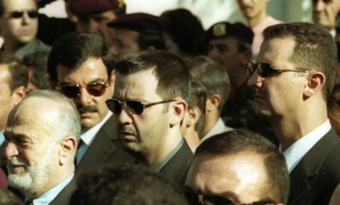Syria ends the year more fragmented than ever
Wednesday, 31 December 2014
Dr. Halla Diyab /Al Arabiya
The most sensible solution to Syria’s upheaval is peace through diplomacy, but is this realistic given the distrust between the government and opposition? With a regime that has a history of haggling, and opposition groups more concerned about power than how to end the war, peace seems too good to be true.
Russia is proposing a re-launch of peace talks in early 2015, which would include Ahmad Moaz al-Khatib, former president of the National Coalition for Syrian Revolutionary and Opposition Forces. He resigned because he thought he could be more effective working outside the coalition.
Respected by Syrians as a Sunni former imam, and sympathetic toward certain Islamist militias, Khatib is seen by Russia as a potential mediator with Islamist rebels to agree a ceasefire and implement a political agreement. Unlike Syrian dissidents who have been in exile for decades, Khatib lived in Syria and has widespread support inside the country.
“To achieve a ceasefire, armed groups should agree first to stop fighting each other. Even then, a political settlement with the very regime they have been fighting for four years seems unviable”
There is a disconnect between political opposition groups and rebel forces fighting on the ground. To achieve a ceasefire, these armed groups should agree first to stop fighting each other. Even then, a political settlement with the very regime they have been fighting for four years seems unviable.
Moderates vs. extremists
The debate over which rebel groups are moderate or extremist constitutes a complex obstacle to negotiations. Most rebel fighters belong to various Islamist factions, such as Ahrar al-Sham, Jund al-Aqsa, Al-Farouq Brigade, Syria’s Martyrs’ Brigade and Al-Tawhid Brigade. They do not hesitate to cooperate with Al-Qaeda’s Syrian affiliate, Al-Nusra Front, against the regime.
A recent report by the Centre for Humanitarian Dialogue says the armed opposition “has become hopelessly radicalized.” So what would stop these rebel fighters from allying with the Islamic State of Iraq and Syria if the Russian initiative does not include Syrian President Bashar al-Assad stepping down?
With Washington panicking over the threat posed by ISIS, the United States is skeptical about the military structure of rebel fighters, and realize that a friend today might be an enemy tomorrow. The Americans have a different vision to that of the Russians. Washington is working to build and equip a new ground force to focus on fighting ISIS, backed by coalition airstrikes. The American strategy conveys that fighting the jihadist group is top of the U.S. agenda.
This might push rebel fighters to cooperate with Islamist groups that share the priority of toppling Assad. The Americans might conclude that Assad can protect Damascus from falling to ISIS, and that negotiations between the regime and opposition groups will allow them to focus on fighting the jihadists, restricting them to northern Syria.
Moscow says it will involve the Americans if the Syrians agree to meet in Russia for talks. Washington will only back the Russian proposal in the hope that a ceasefire will help U.S.-led operations against ISIS. The priority for Gulf Arab states is to prevent the spread of ISIS to their region, and to set up a unified military command and an Interpol-like agency to counter regional foe Iran as well as terrorist groups.
With ISIS demoralized by substantial losses due to U.S.-led airstrikes, and hundreds of its members trying to quit, its leader Abu Bakr al-Baghdad is occupied with rewriting its image through its online propaganda machine. His goal does not include toppling Assad or fighting perpetrators of crimes against Muslims, despite his claims to the contrary. Rather, he seeks to justify his own narrative of violence against the very Muslims he is supposedly fighting for.




















